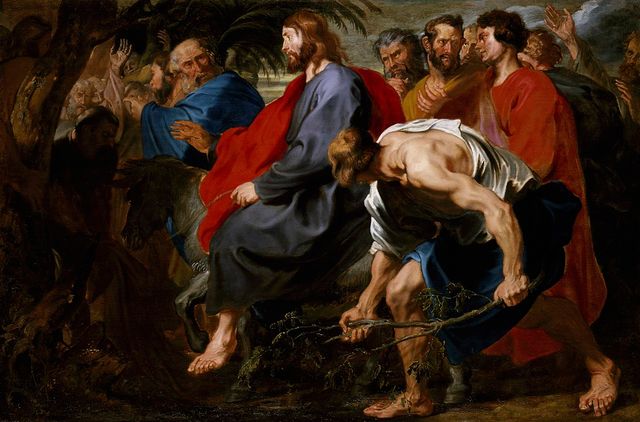
Palm Sunday of the Lord's Passion
Gospel according to Luke 19.28-49
Jesus went on ahead, going up to Jerusalem. When he had come near Bethphage and Bethany, at the place called the Mount of Olives, he sent two of his disciples saying, ‘Go into the village ahead of you, and as you enter it you will find tied there a colt that has never been ridden. Untie it and bring it here. If anyone asks you, ‘Why are you untying it?’ just say this, “The Lord needs it.’ So those who were sent departed and found it as Jesus had told them. As they were untying the colt, its owners asked them, ‘Why are you untying the colt?’ They said, ‘The Lord needs it.’ Then they brought the colt to Jesus; and after throwing their cloaks on the colt, they sat Jesus on it. As he rode along, people kept spreading their cloaks on the road. As he was not approaching the path down from the Mount of Olives, the whole multitude of disciples began to praise God joyfully, and with a loud voice, for all the deeds of power that they had seen, saying, ‘Blessed is the king who comes in the name of the Lord!’ Peace in heaven, and glory in the highest heaven!’ Some of the Pharisees in the crowd said to him, ‘Teacher, order your disciples to stop.’ Jesus answered, ‘I tell you, if these were silent, the stones would shout out.’”

Reflections
As Jesus was carried on the back of a donkey after his birth in Bethlehem to Jerusalem, to Egypt and to Nazareth, so now he is carried on the back of a humble donkey as he is about to complete his mission on earth. We know that in Jerusalem he will be unjustly tried and put to death. He will accept the sacrifice of giving his life for the sins of the world so that those who trust in him can have eternal life (John 3:16). He will be placed in a sealed tomb and guarded, but he will resurrect on the third day and rise again, just as he promised: “We are going up to Jerusalem, and everything that is written by the prophets about the Son of Man will be fulfilled. He will be handed over to the Gentiles. They will mock him, insult him, spit on him, flog him, and kill him. But on the third day he will be raised from the dead” (Luke 18:31-33).
In today’s Gospel, we find a last little hint of just how precisely and accurately Jesus keeps everything that he promises to the last detail. “Go into the village ahead of you, and as you enter it you will find tied there a colt that has been never ridden” (Luke 19:30). This is a very specific description of what the disciples will encounter in the village and how they are to borrow this donkey that Jesus needs for a reason. Upon being questioned by the owner, they reply as they were instructed: “The Lord needs it” and the donkey is theirs (Luke 19:39). Everything happens as Jesus foresaw it. Thus, untying the colt, they brought it to him and threw their cloaks for him to sit on it.
At the center of this event is the colt that Jesus is riding. It is the means through which Jesus will reach the gates of Jerusalem. It was traditional for great leaders to reach the gates of the city riding a chariot, decorated in all colors and insignia, and pulled by war horses, if they came to fight and to defeat their enemies. (1) Jesus riding a humble donkey is contrary to this image. He chose a lowly and peaceful animal, the colt of the donkey, who could be found in the stables where he was born: “For unto you is born this day in the city of David a Savior, who is Christ the Lord. This will be a sign to you: you will find a baby wrapped in cloths and lying in a manger” (Luke 2:11-12) On that night, the angels appeared in jubilation: “Glory to God in the highest heaven, and on earth peace to those on whom his favor rests.” (Luke 2:14) Who is this man, not seeking glory and admiration for himself? According to the Old Testament Prophecy of Zechariah [9:9}, he is the King of kings: “Rejoice greatly, O daughter Jerusalem! Behold, your king is coming to you, righteous and having salvation, mounted on a donkey, a colt the foal of a donkey.” The young donkey, the colt, is a symbol of the New Covenant fulfilling the Old, where the King comes in peace to occupy His righteous place. (2) This is a new epiphany, a revelation for the people who lay their cloaks on the road and celebrate Jesus as he passes by (Luke 19:36).
Jesus reveals the gentle and loving face of the Father as he rides along. (3) The people’s hearts swell and they greet Jesus as the Messiah, the expected Savior. Immediately, the pharisees want to shut them down: “Teacher, order your disciples to stop.” (Luke 19:39). They demand that Jesus puts and end to their hopes and dampens their joy. He puts and end to the spectacle and orders everyone to calm down and go home. Admit that joy is superfluous and there is nothing special happening here. But Jesus is truly the Messiah, and he truly is the king of Kings. There is no way of stopping that which the Holy Spirit has revealed to the hearts of the disciples. And their joy is contagious. The more the Pharisees get annoyed and concerned, the more the crowd grows and erupts in a spontaneous chant: “Hosannah!” “Hosannah!”
“It would be nice if this was true, except it can be dangerous!” one of the Pharisees may have remarked. “It is ridiculous and preposterous!” another one may have retorted. For Jesus’ appearance and demeanor does not match at all the expectation of the Pharisees. (3) The awaited Messiah is supposed to be a physically potent force, annihilating and crushing all adversaries. What is concealed from the eyes and hearts of these Pharisees is that Jesus’ force goes way beyond his physical appearance. It is a spiritual force that pulls all what is true and good to himself, and which triumphs over everything that is evil. In his humility, Jesus is the greatest power on earth and in heaven. (4) Just when he appears most powerless on the cross, that is when the fulfillment of the Scriptures occurs. (5.6) God became incarnate, dwelled among us, and ransomed the world through shedding his blood for our sins, all because of his almighty love (7)
Undisturbed by the confusion and disbelief, the Redeemer of the world advanced step by step, closer to the eternal city, Jerusalem, where this mission was to be accomplished. As he passed by, the people shouted, “Hosannah!” Children ran and tore palm leaves, crying, “Hosannah to the Son of David!” “Blessed is the king who comes in the name of the Lord.” “Peace in heaven and glory in the highest heaven!” (John 12:12-15; Mark 11:1-11; Matthew 21:1-11, Luke 19:28-44). The choir of heaven was echoed on earth.
Today, as then, our salvation is at hand. The King of kings is at the threshold. Shall we tell ourselves to remain silent, go home and close the blinds? Or step forward into the light and welcome him with joy in our hearts. Lord, I want to be among those who welcome you and celebrate you. With words of praise and thanksgiving, I acknowledge that I know who you are: Lord, you are the Messiah, the Redeemer of the World! My Savior!
Sources
- Klubnik, P. (2013). Kings Ride Horses! Biblical Resources. Retrieved from: www.biblicalreasources.org. Accessed: April 10, 2025.
- Oliver, N. (2023). Why did Jesus Ride a Donkey? Retrieved from: www.encounterchurchfw.org. Accessed on: April 11, 2025.
- Keyes, S. (2024). Our Friends the Pharisees. Catholic Living. Retrieved from: www.catholic.com. Accessed: April 11, 2025.
- CCC (2025). Articles 668, 548, 549 and 550. Retrieved from: www.catholicculture.org Accessed; April 11, 2025.
- Strom, J. (2022). The Power of the Powerless. Blessed sacrament Roman Catholic Parish. Retrieved from: bscaz.org. Accessed: April 11, 2025.
- CCC (2025). Article 272, 273 and 274. Retrieved from: www.catholic culture.org. Accessed: April 11, 2025.
- CCC (2025). Article 278. Retrieved from: www.catholicculture.org. Accessed: April 11, 2025.